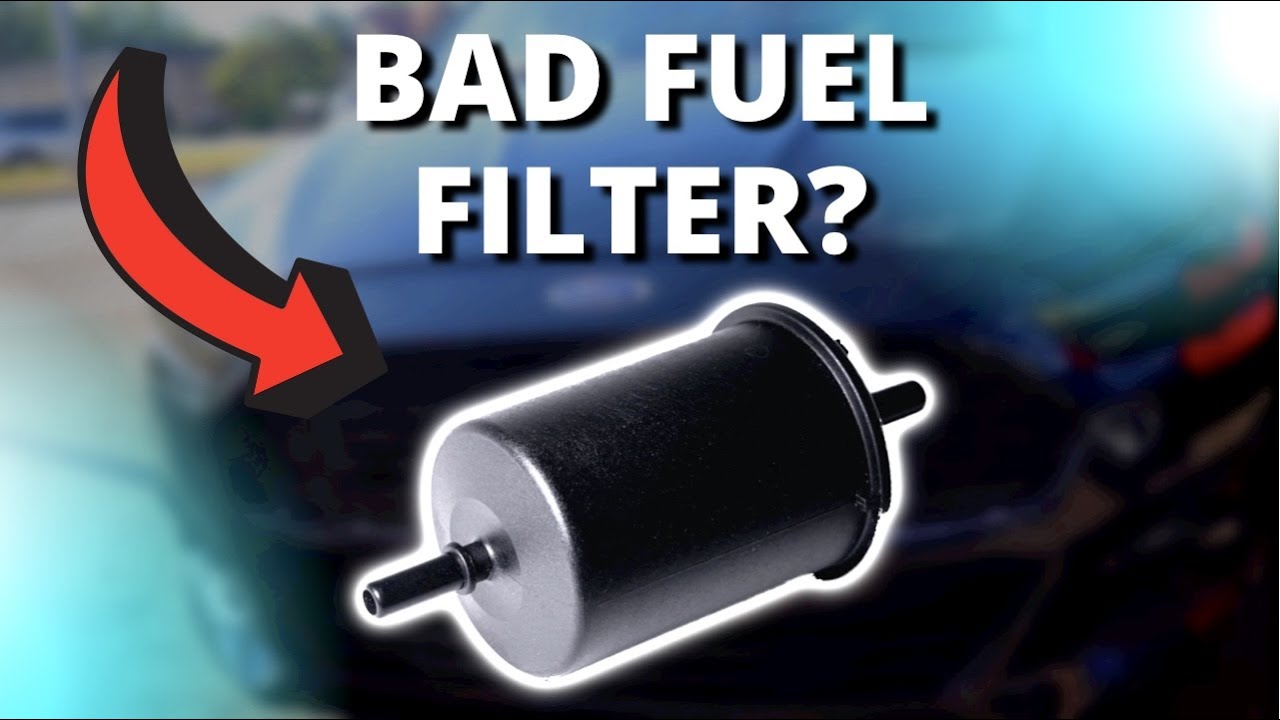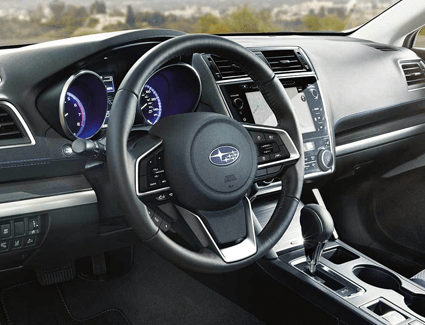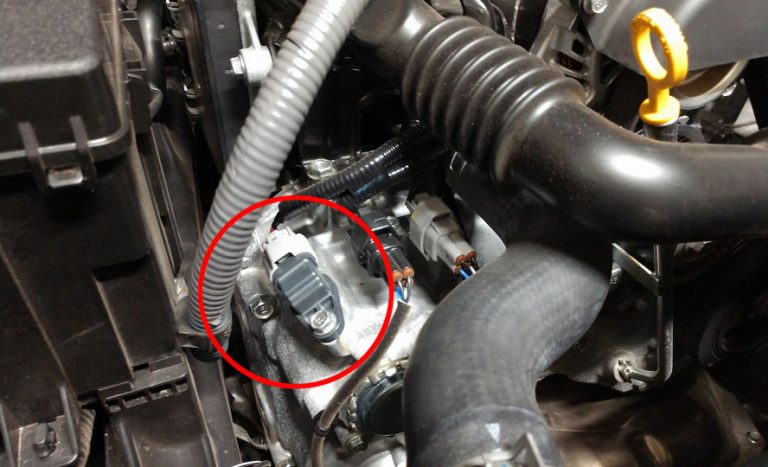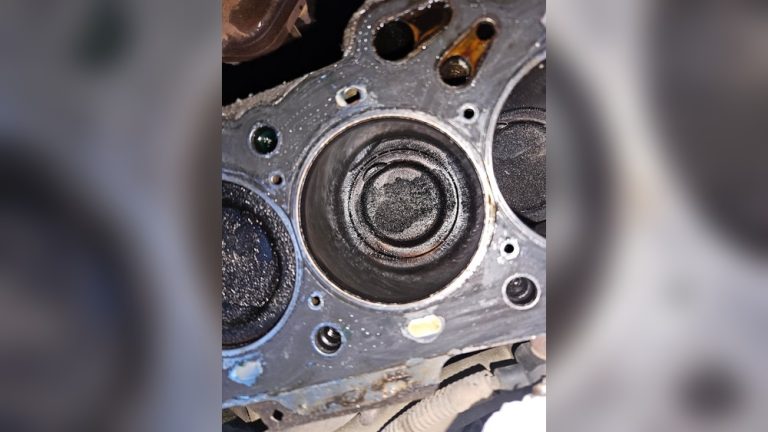Clogged Fuel Filter Symptoms: Detect and Fix Fast
Clogged fuel filter symptoms include engine misfires, difficulty starting, poor acceleration, stalling, and decreased fuel efficiency. You may also notice a rough idle or the check engine light turning on. These signs indicate restricted fuel flow, affecting engine performance and requiring filter inspection or replacement.
This scenario might sound all too familiar if you’ve ever dealt with a clogged fuel filter. It’s easy to overlook such a small component, yet its health is crucial for your vehicle’s performance and longevity. Ignoring the subtle signs of a clogged fuel filter could lead to costly repairs and unnecessary stress.
You’ll discover the telltale symptoms of a clogged fuel filter, helping you to identify problems before they escalate. Understanding these symptoms not only saves you money but also keeps your journey smooth and worry-free. Dive in to ensure your car remains as reliable as the day you got it.

Credit: www.agcoauto.com
Clogged Fuel Filter Symptoms
Signs Of A Clogged Fuel Filter
Sluggish engine performance and trouble starting can indicate a clogged fuel filter. Reduced acceleration and frequent stalling may also occur. Often, these symptoms mean the fuel filter is restricting the flow, affecting the engine’s power and efficiency.
Spotting the signs of a clogged fuel filter early can save you from a lot of trouble down the road. A clogged fuel filter can cripple your vehicle’s performance and even leave you stranded. By recognizing the symptoms, you can address the issue before it escalates.
Read more: Car Struggles to Start But Battery is Fine: Hidden Culprits
Poor Engine Performance
Have you noticed your car struggling to accelerate or experiencing a lack of power when you hit the gas pedal? This could be a sign of a clogged fuel filter. When the filter is blocked, your engine doesn’t receive the fuel it needs, leading to sluggish performance. Imagine trying to run a race while breathing through a straw—frustrating, right?
Engine Stalling
Does your engine randomly cut out when you’re driving or idling? A clogged fuel filter might be the culprit. The inconsistent fuel flow causes your engine to stall unexpectedly. It’s like your car is gasping for air, and it can’t keep up.
Difficulty Starting The Car
You might experience trouble starting your vehicle if your fuel filter is clogged. It feels like your car is teasing you, turning over but not quite starting. This happens because the engine isn’t getting the fuel it needs to start up smoothly.
Unexpected Engine Misfires
Do you feel those unexpected hiccups when you drive? Engine misfires can be alarming, especially if they happen regularly. A clogged fuel filter can lead to these misfires, as the engine struggles to maintain a consistent fuel flow.
Read more: Car Won’t Start in Cold But Battery is Good: Troubleshoot Now
Strong Odors
A noticeable fuel smell in your car or garage might indicate a clogged fuel filter. When the filter doesn’t function properly, excess fuel can leak, producing a strong odor. This isn’t just an inconvenience; it’s a safety concern you shouldn’t ignore.
Reduced Fuel Efficiency
If you find yourself filling up more frequently, a clogged fuel filter could be to blame. A struggling engine uses more fuel to perform basic tasks. Are you paying more at the pump while traveling the same distance as before? By being aware of these signs, you can take action before a minor issue becomes a major headache. Have you experienced any of these symptoms? Address them promptly to ensure your vehicle remains in top shape.
Engine Performance Issues
Struggling to accelerate smoothly? A clogged fuel filter might be the culprit, causing stuttering or poor engine performance. Notice decreased power or frequent stalls? This blockage prevents fuel flow, leading to these symptoms. Act quickly to ensure your vehicle runs efficiently and safely.
When your vehicle’s engine isn’t performing as it should, it can be a frustrating experience. One often overlooked culprit for engine performance issues is a clogged fuel filter. This tiny component plays a critical role in ensuring your engine gets the clean fuel it needs. A clogged fuel filter can lead to a host of problems that impact how your engine performs.
Poor Acceleration
Have you noticed your car hesitating when you press the gas pedal? This could be a sign of a clogged fuel filter. When the fuel filter is blocked, it restricts the amount of fuel reaching the engine. This makes it difficult for your vehicle to pick up speed as it should. Imagine trying to drink a thick milkshake through a narrow straw. The effort it takes is similar to what your engine experiences with a clogged filter.
Engine Misfires
Do you feel your car jerking or sputtering unexpectedly? Engine misfires are a common symptom of a clogged fuel filter. When the fuel supply is inconsistent due to blockages, the engine doesn’t receive a steady flow. This inconsistency can cause your engine to misfire, affecting the smoothness of your drive.
Difficulty Starting The Engine
Struggling to start your car in the morning? A clogged fuel filter might be at fault. If the filter is severely blocked, it can prevent enough fuel from reaching the engine during startup. This makes your vehicle crank longer than usual before it starts.
Stalling
Does your engine stall unexpectedly while driving? A clogged fuel filter could be the reason. When the engine doesn’t get enough fuel, it can suddenly stop running, leaving you stranded. This is particularly dangerous if it happens in traffic or on a busy highway.
Reduced Fuel Efficiency
Are you noticing more trips to the gas station? A clogged fuel filter can lead to reduced fuel efficiency. Your engine has to work harder to pull fuel through a clogged filter. This extra effort can result in burning more fuel than usual, impacting your wallet.
Check Engine Light
Is your check engine light on? While this light can indicate many issues, a clogged fuel filter might be one of them. Modern vehicles have sensors that detect when something is wrong. If the fuel flow is restricted, it can trigger the check engine light. If you’re experiencing any of these symptoms, it might be time to inspect your fuel filter. Regular maintenance can prevent these issues and keep your engine running smoothly. What symptoms have you encountered that were resolved by changing your fuel filter?
Fuel Efficiency Drops
Noticing a drop in fuel efficiency can be alarming. It’s often a sign of a clogged fuel filter. Your vehicle’s engine needs a steady flow of fuel. A blockage disrupts this flow. The engine works harder. Fuel consumption rises. This impacts your wallet. Understanding these symptoms can save money and time.
How Fuel Efficiency Suffers
A clogged fuel filter restricts fuel flow. The engine doesn’t get enough fuel. It struggles to perform efficiently. This results in burning more fuel. You visit the pump more often. The cost adds up quickly.
Engine Struggles With Power
Power loss is common with a clogged filter. The engine lacks fuel. It can’t maintain power. This is noticeable during acceleration. Driving uphill becomes tough. The vehicle feels sluggish. Fuel efficiency drops as a result.
Unusual Engine Sounds
Engines often make unusual noises when fuel filters clog. A sputtering sound is frequent. This indicates fuel flow issues. The engine misfires. It loses efficiency. Fuel is wasted. The noise is a key symptom to watch.
Frequent Stalling
Frequent stalling is another symptom. The engine stalls due to inadequate fuel. It happens more at low speeds. Stalling affects fuel economy. It’s frustrating and unsafe. Recognizing this can prevent further damage.
Check Engine Light
The check engine light may illuminate. It signals potential issues. A clogged filter is one possibility. Ignoring this warning can worsen the problem. Address it promptly. Keep fuel efficiency in check.
Increased Emissions
Clogged filters can cause increased emissions. The engine burns more fuel inefficiently. Harmful emissions rise. This is bad for the environment. It’s also an indication of reduced fuel efficiency.
Diagnosing Fuel Filter Problems
Understanding the symptoms of a clogged fuel filter is crucial. It helps maintain your vehicle’s performance. Recognizing these signs early can prevent costly repairs. A clogged fuel filter can disrupt fuel flow. It affects engine efficiency. Diagnosing fuel filter issues involves observing specific symptoms. These symptoms often show up while driving.
Engine Stalls Or Hesitates
One common symptom is engine stalling. This occurs when fuel flow is restricted. You may notice hesitation during acceleration. If the engine stalls frequently, it may indicate a clogged filter. Regular stalling is a red flag for fuel filter problems.
Difficulty Starting The Engine
A clogged filter can make starting the engine hard. Insufficient fuel reaches the engine, causing starting trouble. If starting takes longer than usual, check the fuel filter. This symptom can worsen over time.
Poor Fuel Efficiency
Fuel filter issues can lead to poor fuel efficiency. When the filter is clogged, the engine works harder. This increases fuel consumption. Monitoring fuel efficiency helps in identifying filter problems. Keep an eye on your fuel mileage.
Unusual Engine Sounds
Listen for unusual sounds from the engine. A clogged filter can cause sputtering or knocking sounds. These sounds indicate fuel flow issues. Regularly check for odd noises while driving. They often signal a problem with the fuel system.
Reduced Engine Performance
Notice any drop in engine power? This is a sign of a clogged filter. Reduced performance occurs when fuel supply is inconsistent. Pay attention to how the vehicle accelerates. A noticeable power loss indicates a filter issue.
Quick Fixes And Solutions
Dealing with a clogged fuel filter can be frustrating. It affects your car’s performance. Quick fixes can help restore functionality. Addressing symptoms promptly prevents further damage. Here are solutions to keep your engine running smoothly.
Inspect The Fuel Filter
Start by checking the fuel filter for clogs. A visual inspection reveals blockages. Ensure it’s clean and free from debris. Regular checks help identify issues early.
Replace The Fuel Filter
If the filter is clogged, replacement is necessary. Purchase a new filter. Follow your car manual for installation guidance. Replacing it is a straightforward process. This fixes many performance problems.
Use Fuel Additives
Fuel additives can help clean the filter. Choose additives designed for cleaning. Add them to your fuel tank. They help dissolve blockages and improve flow.
Regular Maintenance
Schedule regular maintenance to avoid future clogs. Clean the fuel system periodically. This ensures the filter remains clear. Maintenance increases your vehicle’s lifespan.
Check Fuel Lines
Inspect the fuel lines for blockages. Clogs in lines affect the filter. Clear any debris found. This can improve fuel flow and engine performance.
Consult A Professional
If problems persist, consult an expert. Professional mechanics have tools and expertise. They provide accurate diagnosis and solutions. Seeking help prevents further issues.
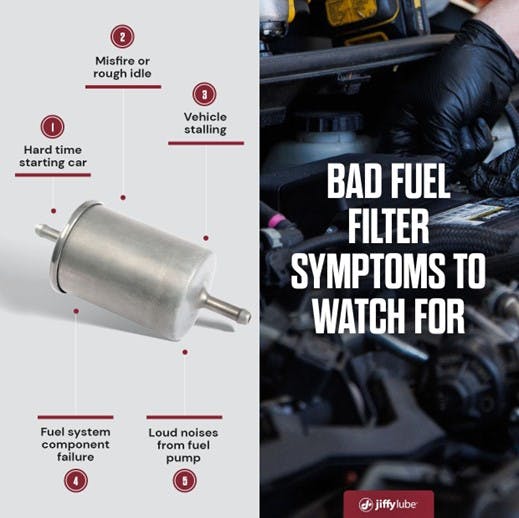
Credit: www.jiffylube.com
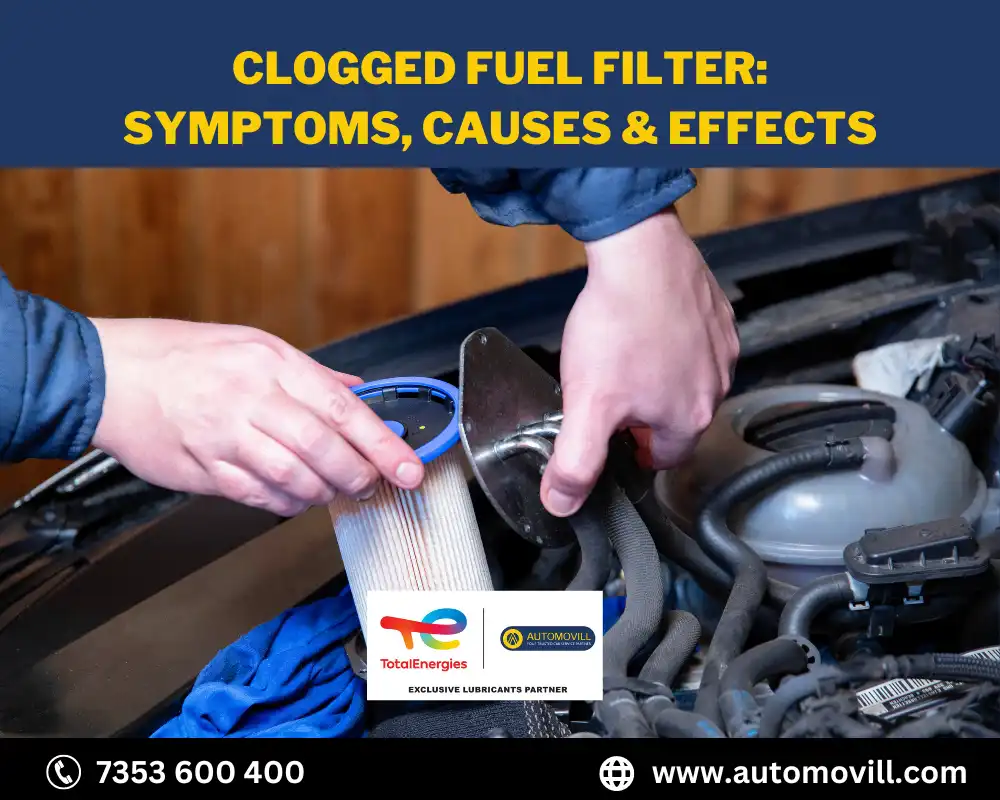
Credit: www.automovill.com
Frequently Asked Questions
What Are Common Clogged Fuel Filter Symptoms?
Engine may stall. Power loss during acceleration. Hard starting. Poor fuel efficiency. Unusual engine noises.
How Does A Clogged Fuel Filter Affect Performance?
Reduced engine power. Increased fuel consumption. Potential misfires. Difficulty starting. May cause stalling or hesitation.
Can A Clogged Fuel Filter Lead To Engine Damage?
Yes. It can cause engine overheating. Stress on fuel pump. Possible damage to fuel injectors and engine components.
Conclusion
Recognizing clogged fuel filter symptoms is crucial for car health. It ensures smooth driving and prevents costly repairs. Look out for reduced engine power. Pay attention to starting issues. Notice any stalling or strange noises. These signs help identify a clogged filter early.
Regular maintenance is key. Change your fuel filter as needed. This simple step keeps your car running efficiently. Always prioritize safety and performance. By understanding these symptoms, you can take action promptly. Keep your vehicle in top shape and enjoy worry-free driving.

